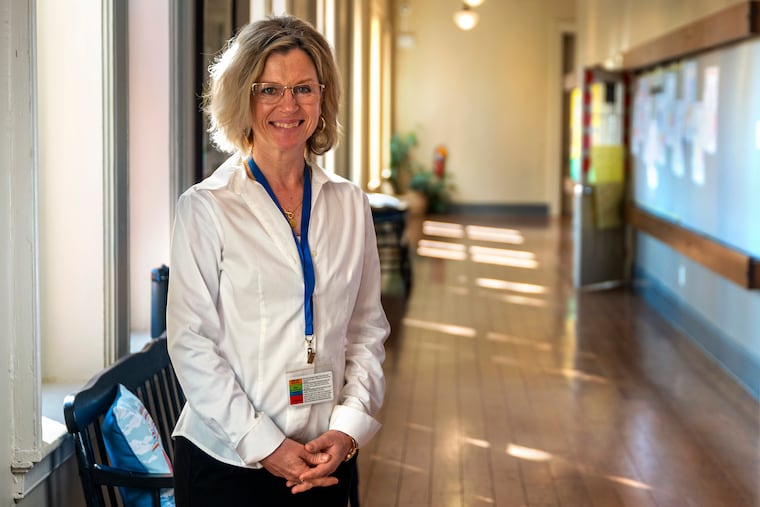Doane Academy, founded for white girls, is now a diverse school with its first woman leader in 50 years
Students travel to the school, located 17 miles north of Philadelphia, from 56 towns in New Jersey and Pennsylvania.

Erin P. Mayo is getting used to making history.
Mayo became the head of independent school Doane Academy in July, the first woman to hold the position in 50 years and the ninth woman to head the school in its 186-year history in Burlington City.
“I really wanted this position,” said Mayo, 54. “I’m blessed that it came my way.”
Before that, she was the first woman to head Fryeburg Academy, an independent day and boarding school in Maine.
After other stints in Vermont and Dallas, Mayo, a former English teacher, believes she has found her place at Doane. Located on the Delaware River across from Bristol, Doane has a rich history that has evolved from its beginning as an elite Episcopal boarding school for white girls.
On a picturesque 15-acre campus in 1837, founder Bishop George Washington Doane founded the school for girls to have access to the same educational opportunities as boys. The school was originally named St. Mary’s Hall before it was changed to Doane Academy in 2008.
Eventually, the school became a co-ed day school enrolling about 235 students grades pre-K to 12. Students travel to the school from 56 towns in New Jersey and Pennsylvania. Busing is provided for most students, and parents help with transportation.
Now, students of color comprise about 55% of the population.
According to Doane officials, the school came close to shuttering in 2000 because of financial problems. At the time, the school was down to about 100 students.
Mayo said then-head of school John McGee was credited with rescuing Doane from financial ruin, developing a recruiting strategy that attracted students with diverse socioeconomic, ethnic and racial backgrounds.
Then in 2015, a $17 million gift from Henry and Eleanor Rowan secured its future. The permanent endowment helped Doane increase its enrollment. The Rowans’ family charitable foundation gave $8.5 million, for a total of more than $25 million.
Lloyd Freeman and his wife, Ebony, of Medford, decided to enroll their daughter, Ailey, then a first grader, in 2020. He said it was “a pandemic decision” to place her in a smaller environment after the coronavirus shutdown.
“The real pleasant surprise was the diversity. That totally sold me on it,” said Freeman, the chief diversity and inclusion officer for Buchanan Ingersoll & Rooney in Philadelphia who recently joined Doane’s trustee board. “We got there, and there were so many Black and brown kids.”
Mayo said Doane remains committed to diversity. The school hopes to boost enrollment to about 250 students.
Doane promotes small class sizes — a 7-1 student teacher ratio — and a college preparatory program that includes character development. The senior class has 31 students. Tuition for the 2023-24 school year ranges from $15,000 for lower grades to $23,500 for high schoolers. More than half of the students receive need-based financial aid.
“We’re intentionally small,” said Robyn Henry, the director of college counseling. “I love it here.”
» READ MORE: South Jersey private school announces expansion, purchases nearby vacant public school
Amber Thomas, of Sicklerville, said her son, Jayden, 14, a freshman, decided to enroll in Doane this year after attending Friends of Mullica Hill School. He saw it as a place where he could be “his authentic self as an African American male.” He has an interest in animation and was drawn to a “maker’s space” class that encourages creativity and innovation.
“He loves it, as much as a teenager will tell you,” Thomas, an educator, said with a smile.
With a nod to its past, Doane holds nondenominational services in its chapel once a week, although the school no longer has a religious affiliation. The chapel, lined with stained-glass windows, and two other campus buildings, are listed on the National Register of Historic Places.
On a recent school day, students changed classes in an orderly fashion, without a bell ringing. Mayo greeted every student, exchanging high-fives with some. She hopes to soon know every students’ name. She meets regularly with student leaders.
To start the school year, Mayo joined the senior class in an annual rite of passage— paddling across the Delaware River in canoes to the riverbank where they were greeted by the entire school.
“It was pretty cool,” she said. “How does the year get better?”
Mayo, married to Peter Gurnis, a retired English teacher, and the mother of two adult children, said she is very conscious of her role as the first female head since 1974. She said she hopes to end her career one day at Doane.
“I want to do right by the people who are looking to see a woman do well,” she said, But “the demands of the job are what I really want to focus on.”